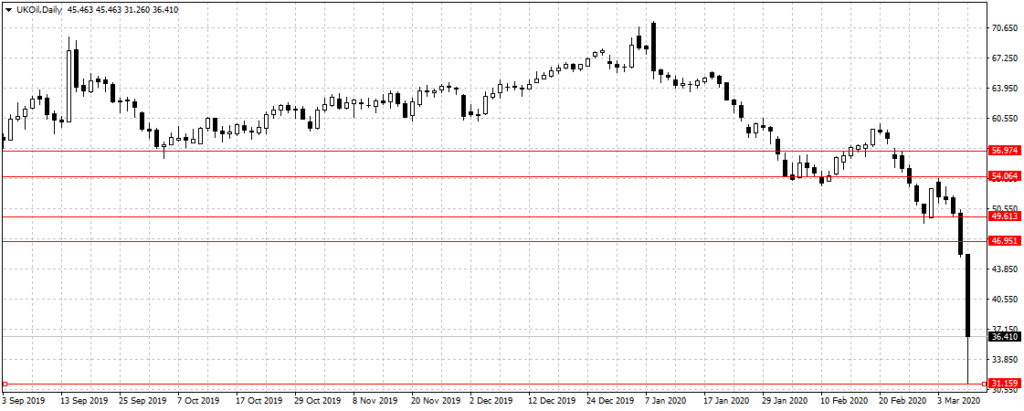- Oil Prices Decline by 30% on Monday as OPEC Fails to Get Russia Onboard
Global oil prices plunged on Monday by 30 percent as the Organisation for the Petroleum Exporting Countries (OPEC) failed to secure Russia supports for the proposed production cut of 1.5 million barrels per day.
Russia had said it favours extension of existing agreement due to expire this month, not additional cut that could hurt the nation’s ability to finance its 2020 budget.
On Thursday, Saudi Arabia and other members of the OPEC+ had agreed to cut crude oil production by an additional 1.5mbpd to artificially prop up oil prices. This, they hope to secure Russia’s support given the state of the world economy with fast-spreading coronavirus.
Russia, however, surprised the cartel when it announced the decision to end further production cut when the current agreement expires this month.
“As from 1 April we are starting to work without minding the quotas or reductions which were in place earlier,” Russian Energy Minister Alexander Novak told reporters Friday at the OPEC+ meeting in Vienna, adding, “but this does not mean that each country would not monitor and analyze market developments.”
Saudi Arabia that is currently pumping 9.1 million barrels per day responded with the largest discount offer in 20 years to sell more crude oil into an already saturated market and planned to up production to 10 million barrels per day knowing it has 12.5 million barrels per day production capacity.
“We believe the OPEC and Russia oil price war unequivocally started this weekend when Saudi Arabia aggressively cut the relative price at which it sells its crude by the most in at least 20 years,” Goldman Sachs analyst Damien Courvalin said in a note to clients Sunday. “The prognosis for the oil market is even more dire than in November 2014, when such a price war last started, as it comes to a head with the significant collapse in oil demand due to the coronavirus,” the firm added.
Analysts have said the inability of the OPEC and Russia to reach an agreement on the production cut could cause further damage to the world’s oil market.
“This has turned into a scorched Earth approach by Saudi Arabia, in particular, to deal with the problem of chronic overproduction,” Again Capital’s John Kilduff said. “The Saudis are the lowest cost producer by far. There is a reckoning ahead for all other producers, especially those companies operating in the U.S shale patch.”
Brent crude oil, against which Nigerian oil is measured, plunged by more than 30 percent on Monday during Asian trading session to $31.16 a barrel before pulling back to $36.41 per barrel at 10:10 am Nigerian time.
 This represents $20.59 below the Federal Government’s $57 per barrel benchmark stipulated in the 2020 budget for the year. With crude oil trading at $36.41 per barrel and the federal government assumed production level for the year stood at 2.18 million barrels per day, Nigeria’s ability to fund the 2020 budget with crude oil revenue is ($20.59 X 2.18) $44.89 million per day off.
This represents $20.59 below the Federal Government’s $57 per barrel benchmark stipulated in the 2020 budget for the year. With crude oil trading at $36.41 per barrel and the federal government assumed production level for the year stood at 2.18 million barrels per day, Nigeria’s ability to fund the 2020 budget with crude oil revenue is ($20.59 X 2.18) $44.89 million per day off.
This could further hurt the nation’s foreign exchange rate and foreign reserves, especially with rising capital flight and falling foreign direct investment at a period when both local and foreign investors are blaming the President Muhammudu Buhari for unclear policy path.

 Forex3 weeks ago
Forex3 weeks ago


 Naira2 weeks ago
Naira2 weeks ago
 Billionaire Watch2 weeks ago
Billionaire Watch2 weeks ago




 Naira2 weeks ago
Naira2 weeks ago




 Naira2 weeks ago
Naira2 weeks ago




 Naira4 weeks ago
Naira4 weeks ago


 Naira7 days ago
Naira7 days ago
 Banking Sector4 weeks ago
Banking Sector4 weeks ago



















